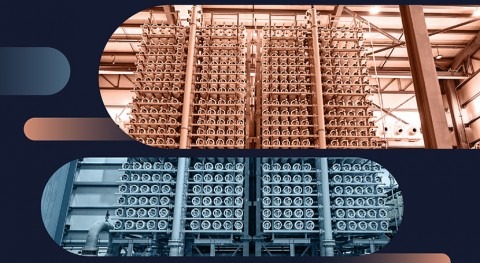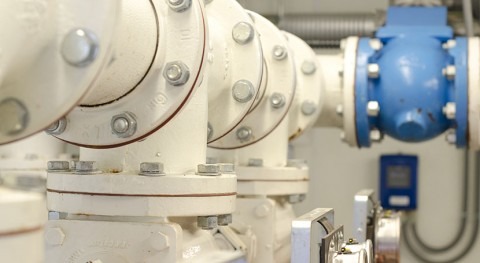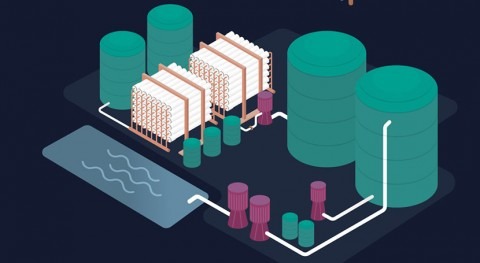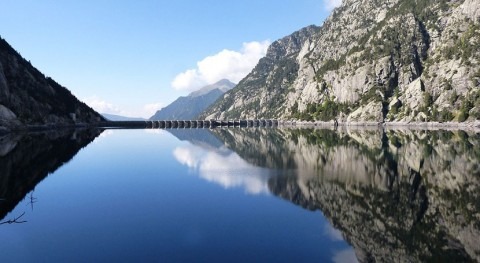EWEC (Emirates Water and Electricity Company), a leading company in the integrated planning, purchasing and supply of water and electricity across the UAE, has released its Statement of Future Capacity Requirements 2024-2037: Summary Report for Abu Dhabi’s future water and electricity production. The Statement forecasts that water production will be nearly emissions-free, less than one kilogram per cubic metre (kg/m3), by 2031. It also recommends the development of an average of 1.4GW of new solar photovoltaic (PV) capacity per year between 2027-2037 and projects that renewable and clean energy are set to provide more than 50 per cent of Abu Dhabi’s electricity by 2030.
EWEC’s Role in the Clean Energy Transition
EWEC is supporting the planning and delivery of Abu Dhabi and the UAE’s net zero strategy for the utility sector and the adoption of renewable and clean energy and low-carbon water solutions in the country. The company’s annual Statement is a key output from its planning processes, outlining EWEC’s recommendations for the generation and desalination infrastructure required to help Abu Dhabi and the UAE achieve their sustainability targets and meet growing power and water demands reliably at least cost.
EWEC is presiding over the largest transformation of the country’s water production infrastructure since the UAE’s foundation, commissioning the development of world-leading, low-carbon intensive reverse osmosis (RO) plants, driving the strategic decoupling of water and power production, and enabling a transition away from legacy thermal desalination infrastructure.
Low-Carbon Intensive RO Capacity
EWEC’s report forecasts that the production of water for Abu Dhabi is set to be nearly carbon-free by 2031, a major milestone for decarbonising the water supply in the UAE.;
The Statement forecasts that water production will be nearly emissions-free, less than one kilogram per cubic metre (kg/m3), by 2031
The transition to a system based on RO technology reduces operational costs and directly lowers the carbon intensity of water production by a remarkable 93 per cent, from 16kg/m3 in 2021 to less than 1kg/m3 by 2031. As part of the latest Statement, EWEC recommends further substantial RO deployment from 2028 onwards, bringing the total RO capacity to over 3.5 million cubic metres per day by 2031, which will serve 92 per cent of the total projected demand.
Solar Power Capacity Increase
Installed solar PV capacity is on track to increase to approximately 7.5GW in Abu Dhabi by 2030, and the Statement recommends developing an average of 1.4GW of new solar PV per year between 2027-2037. EWEC has been fundamental to growing solar PV capacity in the UAE, commissioning the development of some of the largest solar PV projects in the world. Under EWEC’s stewardship, renewable and clean energy are set to provide more than 50 per cent of Abu Dhabi’s electricity by 2030.
Othman Al Ali, Chief Executive Officer of EWEC, said: “In launching this Statement and reflecting upon our journey over the past five years, we stand today at the forefront of a transformative era in the UAE’s energy sector. Our strategic planning and deployment of technologies have catalysed a monumental shift, steering us away from a reliance on gas-fired power and thermal desalination towards a diversified and sustainable energy mix. This pivot is underpinned by the recent inauguration of the world’s largest single-site solar power plant and the pioneering integration of wind power into our portfolio, milestones that underscore our leadership in the global energy transition.
Looking ahead, EWEC and the wider UAE utility sector are poised for a period of accelerated growth and strategic development. We are further decoupling water and electricity production, commissioning the development of new world-leading renewable projects, and enhancing our techno-economic modelling to ensure a secure, reliable, and sustainable supply of water and electricity. Our vision is clear – to lead the UAE's transition to a sustainable future in alignment with the nation's Net Zero by 2050 strategic initiative. This entails a relentless pursuit of decarbonisation, the planned development of an average of 1.4GW of new solar PV capacity per year between 2027-2037, and a future where our water production is nearly emissions-free by 2031.”
Battery Energy Storage Systems
To enhance flexibility in the system and provide operating reserves, EWEC recommends the deployment of 400 megawatts (MW) of one-hour depth of battery storage by 2026. Diversifying the portfolio of assets and technology that supports the integration of a range of renewable and clean energy will be key to ensuring a robust and reliable supply.
EWEC is leading this transformation in part by enhancing the flexibility of its generation system away from water and electricity produced by natural gas-fired generation plants
Future Decarbonisation
EWEC has played a leading role in driving the reduction in emissions from electricity and water production in Abu Dhabi. As outlined in the Statement, large amounts of solar PV, the provision of grid stability services by batteries and the decoupling of power and water cogeneration in favour of electrically powered RO will enable further emission reductions. Despite an increase in demand of around five per cent each year to 2035, EWEC projects total CO2 emissions will decrease by around 50 per cent, from 42 million tonnes per annum (MTPA) in 2019 to approximately 22 MTPA by the mid-2030s, with power emissions intensity falling from 330 kilograms per megawatt hour (kg/MWh) in 2019 to 190kg/MWh by 2030.
Transitional Gas Capacity
As EWEC continues to drive the decarbonisation of power and water supply in the UAE, powering the country’s net zero transition, gas-fired plants will remain crucial for ensuring energy security whilst the country’s energy sector transforms into a clean and renewable-focused industry. It will be a key transition fuel to enable EWEC to meet Abu Dhabi’s 2035 decarbonisation targets as the company continues to successfully onboard new renewable capacity.
EWEC is leading this transformation in part by enhancing the flexibility of its generation system away from water and electricity produced by natural gas-fired generation plants.
As outlined in the Statement, EWEC recommends a further 5.1GW of gas capacity will be required, primarily as transitional capacity to support the integration of renewable energy projects and to provide additional flexibility during peak power demand. This comprises 2.6GW of flexible low-cost Open Cycle Gas Turbine (OCGT) capacity to be available by 2027 and 2.5GW of Combined Cycle Gas Turbine (CCGT) capacity to be available by 2028. This will help meet peak demand from 2027 onwards. A total additional 9.3GW of gas capacity will be required by 2030, which will be realised through existing asset extensions, reconfigurations or commissioning the development of the new OCGT and CCGT capacities referenced above.
EWEC is mandated by Abu Dhabi’s Department of Energy’s (DoE) Clean Energy Strategic Target (CEST) to ensure that 60 per cent of the emirate’s energy needs are met by renewable and clean energy by 2035.















